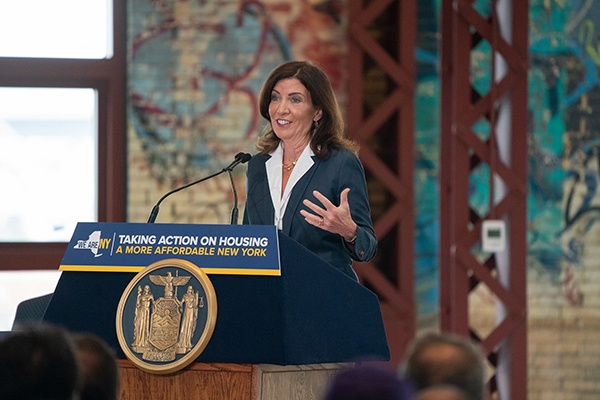|
RCBJ-Audible (Listen For Free)
|
Ramapo Is Certified, And Villages Of Haverstraw, Nyack & Kaser On Path To Participate In State’s Pro-Housing Community Program
ANALYSIS
For years, the Town of Clarkstown has been seeking millions of dollars in New York State grants, including money from the Downtown Revitalization Initiative (DRI), for its stalled Transit Oriented Development project in Nanuet.
But, despite its applications, decisions made by Town Supervisor George Hoehmann to reject an invitation to participate in the state’s Pro-Housing Community Program, have effectively eliminated any hope of Clarkstown receiving DRI funding, or any funding from a number of New York State sources that other Hudson Valley communities can tap into. Unable to secure state funding, Clarkstown has turned to the federal government, through Congressman Mike Lawler’s office, for $10 million for “infrastucture” improvements at the Nanuet TOD. Clarkstown has remained steadfast in its opposition to participation in the Governor’s Pro-Housing Community Program.
The New York State Pro-Housing Community Program is Governor Hochul’s “carrot” after years of using a “stick” approach to impose housing mandates on suburban communities that have been reluctant to expand housing options in their municipalities.
Eligibility for up to $650 million in state grants is only available to communities that participate. According the New York State Homes & Community Renewal Division’s website, only the Villages of Haverstraw, Nyack and Kaser have begun the process of becoming Pro-Housing Communities by issuing Letters of Intent to participate. Last month, New York State certified the Town of Ramapo as a Pro-Housing Community.
None of the four other Rockland towns has expressed any interest or inclination to participate and seem to be willing to forego state funding to avoid having to provide an array of housing opportunities to their constituents even though public officials constantly talk about an affordable housing crisis in their municipalities. Lack of affordable housing countywide has led to a proliferation of single-family homes being converted to boarding houses. In addition, employers experience difficulty hiring people in the service and healthcare industries because people cannot afford to live here.
Last year’s efforts to craft legislation forcing towns and villages to advance housing applications in close proximity to transit lines fizzled out over local government opposition. Earlier statewide efforts to mandate municipal acceptance of accessory dwelling units (ADUs or granny-flats) also failed. More recent efforts to exempt non-profits and religious organizations from local zoning for affordable housing projects went nowhere.
Now, the governor is trying a new approach — financial incentives available only to communities that make a firm commitment to add to their local housing stock, especially affordable housing, through the governor’s Pro-Housing Community Program.
The program is voluntary. Towns and villages opt into the program to access funding available only to program participants. State agencies have been directed to prioritize the allocation of certain discretionary funds solely to those localities that promote the construction of housing.
To join, villages and town must take a series of steps starting with a Letter of Intent to join, sharing of extensive housing and zoning data with the state, and adoption of a model resolution that requires the municipality to take affirmative steps to remedy the negative effects of a housing shortage by:
- Streamlining permitting for multifamily housing, affordable housing, accessible housing, accessory dwelling units, and supportive housing.
- Adopting policies that affirmatively further fair housing.
- Incorporating regional housing needs into planning decisions.
- Increasing development capacity for residential uses.
- Enacting policies that encourage a broad range of housing development, including multifamily housing, affordable housing, accessible housing, accessory dwelling units, and supportive housing.
Part of the resolution also includes a commitment to urban infill and added density where appropriate. The model resolution cannot be altered in any way, and must be passed as written.
Communities are eligible if they can demonstrate through permitting documentation that their housing permitting has increased by a set percentage in the last year or in aggregate of the last three years. Applicants also must submit documentation on their zoning code, zoning map, and last five years of housing permitting, including planning, zoning, site plans, and building permits.
Communities that have not yet seen housing growth can also achieve Pro-Housing Communities designation by passing a resolution stating their commitment to Pro-Housing principles, and submitting documentation on their zoning code, zoning map, and last five years of housing permitting, including planning, zoning, site plans, and building permits.
Locally, only four municipalities have started the process by issuing the necessary letter of intent, and only the Town of Ramapo has been certified. The three villages that applied are Kaser, Nyack and Haverstraw.
In the Mid-Hudson region, thirty-three municipalities have issued letters of intent to participate and twelve have submitted all of the requirements for certification. In Orange County, Newburgh and Kiryas Joel are certified. In Ulster County, Kingston is certified. In Westchester, Peekskill, White Plains, Yonkers, Mamaroneck, New Rochelle, and Croton-on-Hudson are certified.
The state agencies and programs under the Pro-Housing umbrella include: the Downtown Revitalization Initiative (DRI); the NY Forward program; the Regional Council Capital Fund program administered by Empire State Development; the New York Main Street program administered by New York State Homes and Community Renewal; any capital grants made pursuant to the Market New York program; the Long Island Investment Fund; the Mid-Hudson Momentum Fund (a $150 million program invests in mixed-use housing and infrastructure projects throughout the Mid-Hudson Region); the Public Transportation Modernization Enhancement Program (MEP); and any other program designated in the future as part of the Pro-Housing Community Program.
UPDATE (August 9, 2024): Since publication, both the Village of Haverstraw and the Village of Nyack have been certified as Pro-Housing Communities.
















